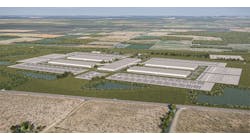ASHRAE Releases Expanded, Revised Version of Standard 90.1
ASHRAE has released an expanded, revised version of a well-known energy standard. ANSI/ASHRAE/IES Standard 90.1-2019, Energy Efficiency Standard for Buildings Except Low-Rise Residential Buildings, contains more than 100 changes from the 2016 version, including numerous energy-saving measures.
“The goal of the 2019 version of 90.1 was to provide clearer guidance for exceeding efficiency goals,” says Drake Erbe, chair of the Standard 90.1 committee. “This new version focuses on energy-saving measures, which we hope will reward designs for achieving energy cost levels above the standard minimum and result in more efficient buildings and more innovative solutions.”
Some significant changes include:
- Administration and Enforcement: Commissioning requirements were added to the standard for the first time. Section 4.2.5, “Verification, Testing, and Commissioning,” was greatly expanded and requirements were outlined for commissioning in accordance with ASHRAE/IES Standard 202.
- Building Envelope: For vertical fenestration, the categories of “nonmetal framed” and “metal framed” products were combined. Minimum criteria for SHGC and U-factor were upgraded across all climate zones. The air leakage section was revised to clarify compliance. Changes to the vestibule section refined the exceptions and added a new option and associated criteria for using air curtains.
- Lighting: Lighting power allowances for the Space-by-Space Method and the Building Area Method were modified. The model is more representative of real-world conditions with the inclusion of updated IES recommendations. A new simplified method for lighting (new Section 9.2) was added. Lighting control requirements for parking garages were updated. Daylight-responsive requirements and side-lighting requirements were updated.
- Mechanical: New requirements were defined to allow designers the option to use ASHRAE Standard 90.4 instead of ASHRAE/IES Standard 90.1 requirements in computer rooms that have an IT equipment load larger than 10kW. Pump definitions, requirements and efficiency tables are included in the standard for the first time.
- Energy Cost Budget Method: Numerous changes were made to ensure continuity. The baseline was set for on-site electricity generation systems.
- Performance Rating Method: Appendix G rules and the corresponding baseline efficiency requirement were clarified. Explicit heating and cooling COPs were provided without fan for the baseline packaged cooling equipment. Rules were added for modeling the impact of automatic receptacle controls. More specific baseline rules were set for infiltration modeling. Clarification was added for how plant and coil sizing should be performed. Building performance factors in Section 4 were updated.
- Both Compliance Paths: Clearer and more specific rules were added related to how renewables are treated. Extensive updates were added to the rules for lighting modeling.
Also new to the standard is use of the new fan energy index (FEI) as the metric for efficiency provisions for commercial and industrial fans and blowers.
Standard 90.1 has been a benchmark for the commercial building energy codes in the United States and a key basis for codes and standards around the world. The 2019 version is the 11th edition published since the original standard was first published in 1975.
To purchase Standard 90.1, visit www.ashrae.org/bookstore or contact the ASHRAE Customer Contact Center at 1-800-527-4723 (United States and Canada), 404-636-8400 (worldwide), or via fax at 678-539-2129.



